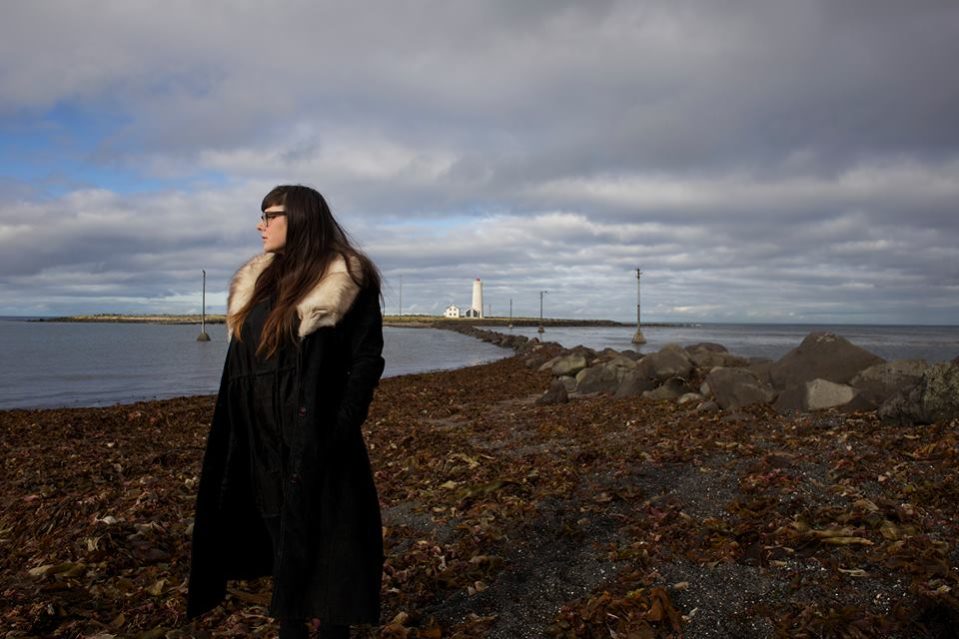Interview: Jade Bergeron of Flying Hórses brings her music to Iceland

Music can take us to new places. We’ve all done it before – for escapism, or for the simple pleasure of disconnecting for a little while. Few Canadian musicians have concocted an album that manages to open up a portal to another world better than Ottawa’s Flying Hórses. The orchestral stylings of Flying Hórses is the brainchild of multi-instrumentalist and composer Jade Bergeron, who seems to have nearly perfected the art of transcribing feelings and memories into grandiose musical arrangements. With the addition of cellist Raphael Weinroth-Browne (also of Musk Ox) in 2013, Flying Hórses has become a true instrumental portal into the deepest caverns of our minds – both to live audiences and to listeners of their pivotal 2015 debut album, Tölt.
Many of us who have the pleasure of knowing Bergeron are familiar with her connection to Iceland. Not only was she influenced by Icelandic musicians such as Amiina and Jónsi & Alex, but Tölt (which approximately translates to “trot” in English) was mastered by Birgir Jón Birgisson (Sigur Rós) at Sundlaugin Studio, the home studio of Sigur Rós in the town of Mosfellsbær in Iceland. A country as mysterious and captivating as Iceland is one that escapes most travellers in favour of more popular destinations in Europe. However, Bergeron was powerless towards its beautiful magnetism and finally made her first trip to the country in late 2014, only to return there indefinitely to pursue her dreams in October of 2015.
We spoke to Bergeron to get a better sense of her almost spiritual bond with Iceland, and discuss her plans as a musician in the far-off land.
1. Your music comes across as nostalgic, like the soundtrack to a story or distant memories. Can you talk about your approach to music and how Flying Hórses came to sound the way it has?
Flying Hórses is a project that manifested itself back in 2012. I was listening to a lot of ambient/experimental music at the time, and was going through some personal things that made me reflect a lot on my childhood. I started composing sounds that initially were never meant to be shared. It wasn’t until 2013 that I started playing shows with Raph [Raphael Weinroth-Browne], and it wasn’t until summer of last year that I decided to record the album.
2. Those who know you know about your connection to Iceland. Can you tell us how this connection came to be?
In 2010, I met an Icelandic musician in New York, that I really admired. He was playing a concert for the White Light Festival, and that was sincerely the most amazing concert I’ve ever attended in my life. It was inexplicably magical, and changed the way I heard and experienced live music. That whole evening was just really special. The following year, I met him again and was introduced to more musicians from the Icelandic music scene. It seemed to me at the time that everything coming out of Iceland was next level. I think it was in 2011 that I really started getting into a lot of the bands that I listen to now. It’s really crazy to think I’ve played some shows with some of these musicians in the last year.
3. Your path has led in an unusual direction compared to most indie bands, having recently moved to Iceland. In what way is the move a personal journey, and also a musical one?
I decided last year, after recording my parts for the album, that I wanted to move to Iceland. It wasn’t later that fall that I realized it was ‘home’ for me, at least for now. Moving to a foreign country, where you don’t speak the language, or know a lot of people is super scary, for sure. It’s totally worth it though – to wake up by the sea and be able to go to the root of my inspiration. I’ve always felt like a black sheep when it comes to music. I spent a lot of time back home trying to find ways to ‘fit in’ with other local bands, but it wasn’t until my first show in Iceland that I realized if I’m going to be a black sheep, I might as well be a black sheep amongst other black sheep. Iceland has so much cinematic music going on. I feel like I have a lot to learn from being here.
4. Which Icelandic musicians are you listening to currently, or have had an impact on you in the past?
I’m really into Mammút, DJ. Flugvél Og Geimskip, and Sóley right now. I have certainly been impacted by bands like; Amiina, Jónsi & Alex, and Múm.
5. What is the main difference between being a musician in Iceland versus being one in Canada?
The creative flow that runs through the Icelandic music and art community is endless but I feel there’s less of an emphasis on competitiveness, because Icelandic artists are mostly all friends and bandmates. I simply feel like there is more room to grow, feel, write, explore here. I have a very strong connection to Iceland and I would like to give Flying Hórses the opportunity to be creative in this sort of musical environment.
6. What are your short-term and long-term plans? Any new music on the horizon?
I was hoping to meet more musicians from the community, and possibly play Iceland Airwaves music festival next year or something but as it turns out, I’ll be playing this year’s festival on November 4th. The album is also for sale now at 12 Tónar, Iceland’s renown label and music store. I’m hoping to just be creative in whatever way possible while I’m here. I’m currently composing and writing a lot of new material, that I’ll be performing in the upcoming months. Who knows, maybe they’ll be some vocals on the next record.
